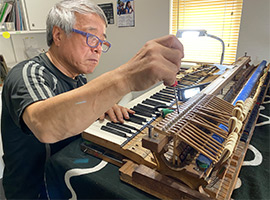- > Top Page
- > About JASRAC
- > JASRAC Music Culture Award
- > “The Seventh JASRAC Music Culture Award”
“The Seventh JASRAC Music Culture Award”
JASRAC Music Culture Award was established in November 2014 to shed light on individuals, organizations and works in various fields that contribute to the development of music culture, through important activities that may otherwise not be heralded or lead to impressive statistics in sales and works usage, to provide encouragement for future endeavor.
The seventh award was presented to the following individuals on November 18, 2020. The awardees were presented with plaques and additional prizes.
TAKII KeikoMusicologist and Music Producer
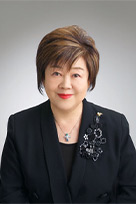
Reason behind her receiving the award
Achieving great result through her research, Takii Keiko explored how people accepted Western music, which played an important role in the modernization of Japan, in the works of the great literary figures such as Mori Ogai and Natsume Soseki. In addition, as she reprinted the translated works of opera, which were translated by Japanese writers and were buried in the history of Japanese music, she managed to realize a number of stage performances of such works. She is also active as a producer of unique projects that find new direction for art appreciation, such as holding concerts and events that make full use of music, art, lighting and videos through her own lectures in museums and business districts.
Comments
I have rigorously studied the origins of the history of modern Japanese Western music, and have executed peculiar activities such as presenting the results not only by writings but also by stage performances. I am honored to receive this award which appreciate my unglamorous work.
Profile of the Awardee
Takii Keiko was born in 1946 in Sapporo city and finished a master's degree at Graduate School of Tokyo University of the Arts. Her field of specialization was the history of Japanese music in Meiji period. After investigating the translated work of Gluck's opera by Mori Ogai, she started to study the history of Japanese acceptance of Western music. She discovered and performed the opera “Orpheus und Eurydike (Orfeo ed Euridice)“, which had never been performed since it was translated by Mori Ogai in 1914. Her writing “Natsume Soseki and Classic Music“ was published by the Mainichi Shinbun and she co-wrote “Kota Nobu's Diary in Europe“ which was published by the GeidaiPress from Tokyo University of the Arts. She has served as specially appointed professor at Public Collaboration Center of Tokyo University of the Arts, specially appointed professor at Kurashiki Sakuyo University, and visiting researcher at the National Museum of Western Art. In recent years, she has been engaged in welfare activities through art.
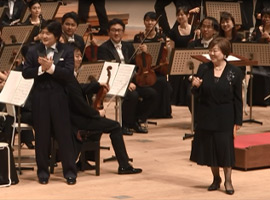
NISHIWAKI YoshinoriMusic Producer and Conductor
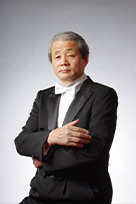
Reason behind his receiving the award
From the standpoint of the conductor who leads the Der Ring Tokyo Orchestra, Nishiwaki Yoshinori pursues his own ideal sound with unprecedented ideas in order for the audience to hear the best sound of the orchestra. Based on his experience as a recording producer and his experience at the European music festivals, along with his interaction with a number of musicians, he embarked on a novel and flexible arrangement to deepen the communication between music players. He has also shown new possibilities of orchestra, which brought fresh ideas to musicians who were struggling with arrangement of players under the circumstance of the Covid-19 pandemic.
Comments
It is my honor to receive this award. Those doubts about the orchestra's common sense I had, motivated myself to establish the Der Ring Tokyo Orchestra. I will continue to strive to achieve better performances by getting back to the basic of the ensemble, to ensure both the performers and the audience are satisfied.
Profile of the Awardee
Nishiwaki Yoshinori was born in 1948 in Nagoya city. He started to play cello at the age of 15 and was a member of Keio Wagner Society Orchestra during his college days. In 1971, he joined Universal Music (Nippon Phonogram at that time). In 2001, he established N&F Ltd with the recording expert Fukui Suenori and has worked on recordings and productions of CDs with Nagaokakyo Chamber Ensemble, Saito Kinen Orchestra, Mito Chamber Orchestra, Joseph Lin, Aoki Juro, Miyata Dai, and others. He attended lectures given by Mr. Michel Corboz in 2001 and learned conducting and vocalism. In 2013, he establishing the Der Ring Tokyo Orchestra as the producer and conductor. Following his activities centered on recordings, he held his first concert of the orchestra in 2018.
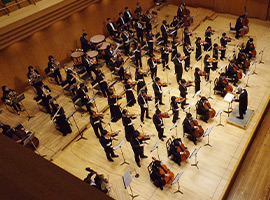
YAMAMOTO NobuoPiano Restorer
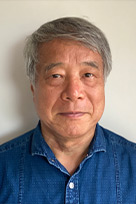
Reason behind his receiving the award
Yamamoto Nobuo has mastered the extraordinary skill, which is unique in the world, to restore and rebuild the old musical instrument "Fortepiano". Fortepiano was the prototype of the modern piano which was on a built-to-order basis during the beginning of the 18th century to the first half of the 19th century, and had contributed to the creation of numerous classical masterpieces by great composers such as Beethoven and Chopin. Yamamoto Nobuo's skill brings the sound that is buried in the history of music back to the modern times. He is also a collector of fortepiano, who not only provides the fortepianos to many concerts that are aimed at recreating sound of the old times with old musical instruments, but also gives speeches at lectures in concerts.
Comments
I am honored to receive this award. Piano has changed with the times. Nowadays, the sound of the fortepiano of Beethoven's period is accepted in the present day again, giving people refreshing feeling and new sensation. I will continue to do my best to impress more people.
Profile of the Awardee
Yamamoto Nobuo was born in 1948 in Sakai city, Osaka. He became an independent piano technician/restorer in 1974. After that, he got trained at BÖsendorfer in Austria. From 1989 to 2019, he served as the first Japanese guest fortepiano restorer at the Department of Traditional Musical Instruments of Kunsthistorisches Museum Wien (the National Museum of Art History of Vienna).
Since 1998, he has exhibited his collection of fortepianos in the "Space Cristofori Sakai" and has also provided them to concerts and lectures. In 1999, he succeeded in restoring a fortepiano which was made in 1726 accurately, and received international acclaim following the exhibitions and concerts at "The Europiano Congress 2000" (Italy), the National Museum of Art History of Vienna and other places. He has been a part-time lecturer at Faculty of Music, Osaka University of Arts since 2013.
